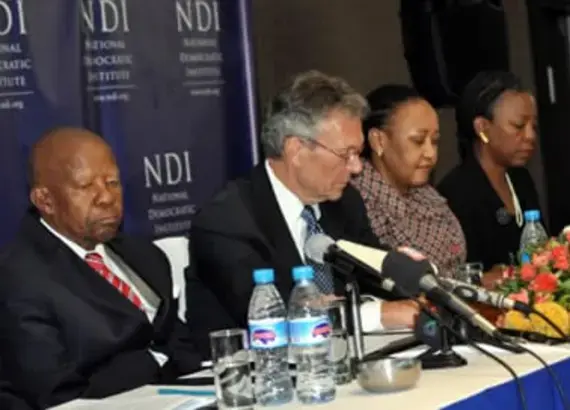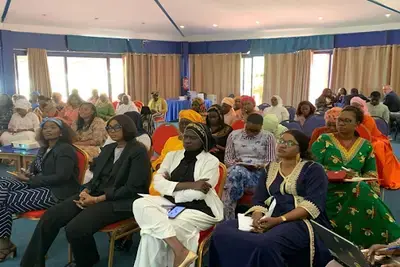
Success Story
Concerted Efforts Needed in Zambia for Credible, Peaceful Elections, NDI Delegation Finds
Zambia is in a position to move forward significantly if its elections next month are credible and peaceful. But the electoral environment presents noteworthy challenges that require tolerance, the rule of law, leadership and participation, a pre-election assessment mission from NDI said in a report released in Lusaka Aug. 18.
The delegation was observing preparations for Zambia’s presidential, parliamentary and local elections to be held on Sept. 20.
“Concerted efforts are needed for credible, peaceful elections in Zambia” His Excellency Quett Ketumile Masire, former president of Botswana and delegation co-leader, said at a news conference. “Broad citizen participation, combined with responsible actions by all stakeholders will contribute to electoral integrity and build public confidence.”
Delegation co-leader Thomas Daschle, former U.S. Senate majority leader and vice chair of NDI’s board of directors, noted that “Zambia’s history of relatively peaceful elections provides a valuable foundation for the 2011 elections. Improving transparency, enhancing inclusiveness and expanding accountability surrounding the elections will buttress that foundation and better ensure that the will of the voters is accurately recorded and honored.”
The delegation was impressed by numerous positive factors in the electoral environment, and, at the same time, noted several important shortcomings that cause serious concern. Among the positive features were:
- The Electoral Commission of Zambia’s (ECZ’s) efforts to open the electoral process and encourage participation;
- A significant degree of confidence in the integrity of the ECZ’s chairperson;
- Political parties and their candidates vigorously contesting the elections;
- Significant interest in voting among young people;
- Civil society and religious leaders calling for peaceful elections;
- Civil society’s mobilization of nonpartisan election monitors and voter education efforts; and
- Significant measures by the Zambian police to ensure political impartiality of officers and improve professional conduct relating to elections.
Among the important shortcomings in the electoral environment that cause serious concern were:
- Irresponsible and inflammatory rhetoric by political parties and candidates;
- Instances of political intimidation and potential for electoral related violence;
- Blatant pro-government bias in the public media, as well as bias and inaccurate reporting in all major media;
- Inadequacy of avenues for legal redress when challenging results of the presidential election and the lack of expedited processes for challenging election results;
- Efforts to discredit some nonpartisan civil society organizations and impede the right to full participation;
- Decrease in the number of women candidates for seats in the National Assembly and apparent barriers to women pursuing candidatures; and
- Lack of transparency in campaign financing and the absence of restrictions on donations, as well as the unequal access to resources.
The delegation offered 10 recommendations:
- The presidential candidates and the leaders of their respective political parties should issue explicit, forceful and repeated calls for peaceful elections and mobilize party resources to sanction any of their party members who engage in electoral violence or political intimidation.
- Candidates and the leaders of their respective political parties should pledge publicly to adhere to the Electoral Code of Conduct and refute the use of inflammatory rhetoric for the entire campaign period.
- Candidates and leaders of their respective political parties should ensure that copies of the Electoral Code of Conduct are provided to all of their party activists and organize discussions of it, including how to seek redress through lodging complaints with the ECZ and invoking mediation efforts through the Conflict Mitigation Committees and other liaison efforts of the ECZ and civil society.
- Media, both public and private, should adhere to the provisions of the Electoral Code of Conduct, laws and professional ethics concerning the accuracy, balance and access regarding candidates and broader electoral related coverage.
- The ECZ should use every effort possible to implement its enhanced results tabulation process and ensure that political party polling agents, citizen election monitors and the media are provided full access to each stage of the process, including providing them copies of the signed results sheets at each level.
- The ECZ and all relevant government agencies should vigorously promote the full participation of citizens in the electoral process, as voters and as candidates, including identifying and removing barriers to participation of women, youth, people with disabilities and other traditionally marginalized groups.
- Civil society, including faith-based organizations, should mobilize to promote electoral participation, peaceful elections and accountability through election monitoring activities and report accurately and in a timely fashion on their efforts and findings.
- The ECZ should guarantee access of political party agents, nonpartisan election monitors, observers and media to all aspects of the election process, including vote tabulations, and should provide them timely accreditation, without undue restrictions.
- The ECZ should consider implementing enhanced transparency measures concerning procurement actions of all sensitive electoral items (e.g., electronic voter registration, ballots and electronic results tabulation) and for all contracts over a specified significant amount of funds (such measures could include, e.g., advance announcement of procurement actions, including experts from political parties and civil society in the design of requirements).
- The ECZ and the courts should ensure that expedited procedures are in place to process all electoral related complaints and challenges, should inform the public and the electoral contestants about such procedures and report publicly and in a timely fashion about how many such matters are lodged, the actions taken, and the nature and incidence of sanctions or remedies provided.
The delegation comprised His Excellency Quett Ketumile Masire, former president of Botswana; Thomas Daschle, former U.S. Senate majority leader and vice chair of NDI’s board of directors; Ayo Obe, former chair of the Steering Committee of the World Movement for Democracy and former president of the Civil Liberties Organization in Nigeria; Pat Merloe, NDI’s director of electoral programs; Keith Jennings, NDI’s senior associate and regional director for Southern and East Africa; and Xoliswa Sibeko, NDI’s resident director in South Africa.
While in Lusaka, the group met with senior government officials, including President Rupiah Banda; election administrators; political party candidates and representatives; civil society, business and women leaders; media representatives; citizen monitors; security forces; religious leaders; and representatives of the international community who are supporting the electoral process and political development.
The delegation assessed the prevailing political environment in Zambia and preparations for the elections, and identified areas where improvements may be needed to guarantee the integrity and transparency of the polls and increase public confidence in the electoral process. The Institute will continue to monitor the electoral process and, as appropriate, share its findings and recommendations with electoral authorities, political contestants and the public.
On Aug. 8, NDI deployed 10 long-term international observers, including members of the Southern African Development Community’s Election Support Network, throughout Zambia’s nine provinces. The international observers are conducting their activities in a nonpartisan manner in accordance with applicable law and international standards for election monitoring set forth in the Declaration of Principles for International Election Observation. Over the last 25 years, the Institute has conducted more than 200 election observation missions worldwide.
NDI’s Zambia election program is supported by the British Department for International Development (DFID) and the United States Agency for International Development (USAID). In addition to the international observation, the Institute is assisting a nationwide domestic election observation coalition; working with political party trainers from across the political spectrum to strengthen their poll watcher training; and supporting women’s political participation through campaign training. NDI provided technical assistance to Zambian civic organizations doing election monitoring in 2008 and 1991.
Related:
Published Aug. 18, 2011



